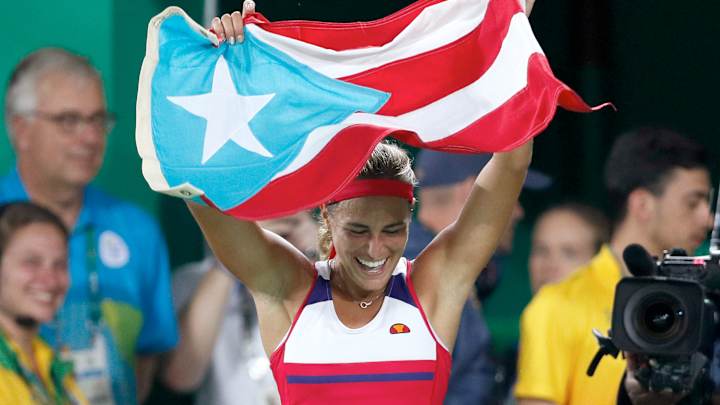In tennis, Puig wins Puerto Rico's 1st Olympic gold ever

RIO DE JANEIRO (AP) The spectators told Monica Puig they believed she could win Puerto Rico's first Olympic gold medal in any sport, providing a soundtrack of ''Si se puede!'' - ''Yes, we can!'' - during the Rio de Janeiro Games women's tennis final.
She could. And she did.
The unseeded and unheralded Puig capped her run of upsets with the biggest one of all Saturday, overpowering No. 2 Angelique Kerber of Germany 6-4, 4-6, 6-1 to become the Olympic champion.
''I did hear everybody saying, ''Yes, you can! Yes, you can! Yes, you can!' I kept repeating it inside myself: `Yes, I can! Yes, I can! Yes, I can!''' Puig said. ''They really helped me believe and just showed me they were there for me, whether I was going to win or lose.''
Puig's father told her he believed, too, emailing the lyrics to the Puerto Rican national anthem a day earlier, just in case they would come in handy.
And so, as the strains of that song echoed around an Olympic arena for the first time, and Puerto Rico's red-white-and-blue flag was raised to the highest level during a medal ceremony for the first time, Puig remembered what Dad had written.
She recognized plenty of the words as fans belted them out.
She just couldn't join in the joyous chorus, for a simple reason: too many tears.
''If I would've stopped crying, I probably would have started singing,'' Puig said afterward, smiling at the thought. ''But I couldn't. I was choking up the whole time.''
A 22-year-old born in San Juan, Puerto Rico, and now based in Florida, Puig is also the first woman representing her country to earn a medal of any color. When she finished a tense closing game - saving six break points and converting her fourth match point - she flung away her racket and went over to collect a flag she paraded across the court.
''I couldn't really believe what just happened,'' she said. ''It was such an amazing moment.''
Gigi Fernandez, who is Puerto Rican, won two Olympic women's doubles gold medals in tennis, but did so while representing the United States.
''I'm particularly happy for Puerto Rico,'' Fernandez said in a telephone interview from Connecticut. ''All the hurt that people felt, all the anger people felt because I played for the U.S., I couldn't be happier.''
Puig had shown promise in the past, reaching the fourth round of Wimbledon as a teen in 2013, but she hasn't been that far again at any major.
Also notable about Puig: She is the first unseeded woman to win the singles title since tennis returned to the Olympics in 1988. Ranked 34th, she added her surprising win over Kerber - a German who won the Australian Open and was the Wimbledon runner-up this year - to those she picked up in Brazil against two other past major title winners, Garbine Muguruza and Petra Kvitova.
Earlier Saturday, Kvitova earned the bronze for the Czech Republic by beating Madison Keys of the United States 7-5, 2-6, 6-2.
Kvitova called her medal ''one of the best things that happened in my career, definitely.''
Clearly, Puig felt the same.
And she played attacking tennis full of powerful shots that seemed to rattle the counter-punching Kerber.
Puig smacked a down-the-line backhand - her 18th winner to that point, 10 more than Kerber - for a break that gave her the opening set.
During the ensuing changeover, Kerber was visited by a trainer, standing on the sideline while her lower back was massaged and manipulated, before heading to the locker room for a medical timeout. Kerber said later that bothered her from the outset, but it wasn't why she lost.
''She played her best tennis and one of her best matches in her career, for sure,'' Kerber said. ''I tried everything.''
---
Follow Howard Fendrich on Twitter at http://twitter.com/HowardFendrich
---
AP Sports Writers Jon Krawczynski and Tim Reynolds contributed.
